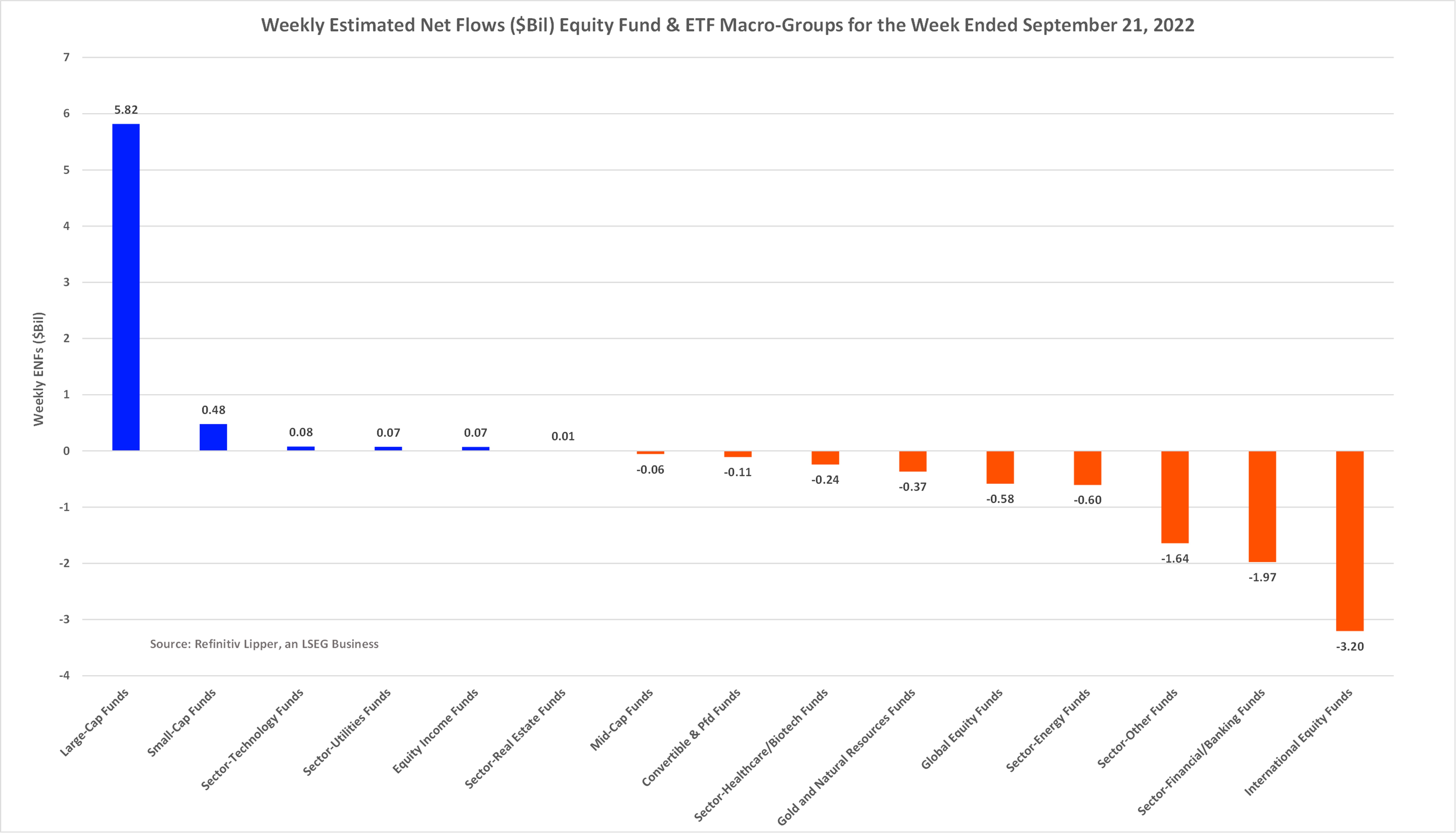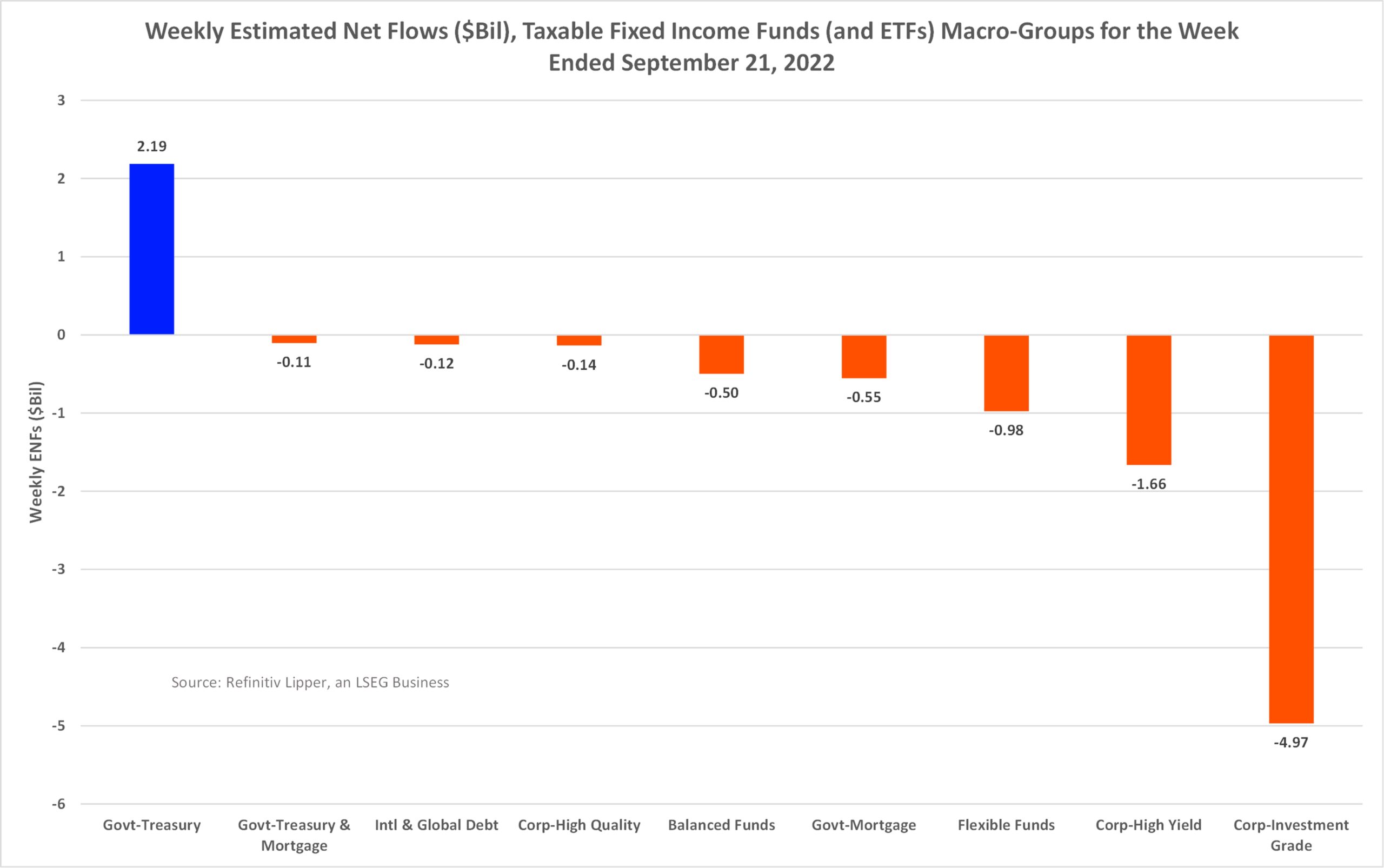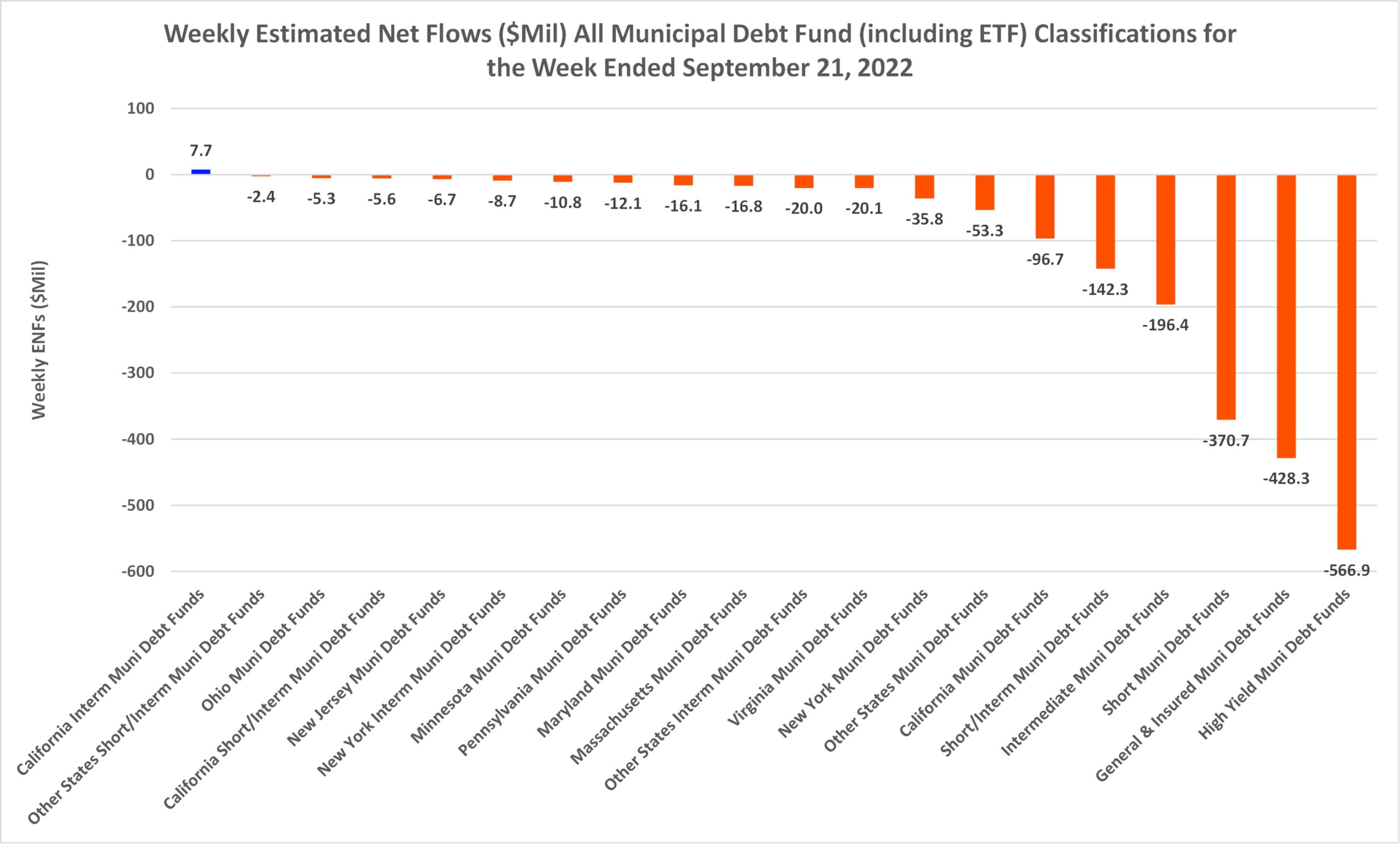For the Refinitiv Lipper fund-flows week ended September 21, 2022, money market funds was the only asset class to attract net new money for the week, taking in $30.0 billion, while taxable fixed income funds (including ETFs, -$6.8 billion), equity funds (-$2.3 billion), and tax-exempt bond funds (-$2.0 billion) all suffered net redemptions after the Federal Reserve Board raised its key lending rate at the end of the flows week.
On September 21, as expected, the Fed raised its fed funds rate by three-quarters of a percentage point (75 basis points). It was the Fed’s third hike in as many meetings, bringing its target range to 3.00% and 3.25% and its highest level since 2008 in a bid to combat inflation.
In a quasi-coordinated effort to battle inflation, about 90 central banks have raised their key lending rates this year, pressuring both equities and fixed income securities, which historically were seen as low or uncorrelated assets—generally zigging while the other is zagging. Year to date, the average equity fund is down 20.67%, while its taxable and tax-exempt fixed income counterparts are down 10.88% and 10.79%, respectively.
For the week, on the equity side, the alternative funds macro-group (+0.35%) posted the only plus-side returns, with Dedicated Short Bias Funds (and ETFs) rising 7.76%, followed by Alternative Managed Futures Funds (+1.54%) and Alternative Equity Market Neutral Funds (+0.20%). In contrast, the sector equity macro-classification (-5.21%) witnessed the largest market declines, with Alternative Energy Funds and Consumer Services Funds—both experiencing 5.56% declines—suffering the largest losses in the subgroup.
As might be expected given the large market selloff this week, the Equity Leverage Funds classification (-8.56%) witnessed the largest decline of all equity classifications for the week, bettered by Global Science & Technology Funds (-6.92%), while the average Latin American Fund (+2.03%) posted the second largest gain of all equity classifications.
From a valuation point of view, value-oriented funds continued to mitigate losses better than their growth-oriented counterparts. And from a capitalization perspective, large-cap funds mitigated losses better than their mid-cap and small-cap counterparts as investors appear to be continuing the search for large dividend payers with wide economic moats and strong balance sheets.
Large-cap funds (including ETFs) (+$5.8 billion) were the primary attractor of investors’ assets in the equity space this week, followed by small-cap funds (+$478 million) and sector-technology funds (-$76 million). However, investors continued to shun nondomestic equity funds and rate-sensitive issues, redeeming a net $3.2 billion for the week from international equity funds and $2.0 billion from sector-financial/banking funds.

On the equity side of the equation, SPDR S&P 500 ETF (SPY, +$4.0 billion) was the primary attractor of net new money for the flows week, followed by Invesco QQQ Trust 1 (QQQ, +$1.7 billion, and Pgim Jennison Small Company Fund- Class R6, +$880 million)
Fixed income funds continued their decline during the week after Fed Chair Jerome Powell said at the Federal Open Market Committee press conference:
“My main message has not changed since Jackson Hole. The FOMC is strongly resolved to bring inflation down to 2% and we will keep at it until the job is done.”
The Fed, starting this month, has also begun a program to shrink its asset portfolio. The central bank will reduce its $8.8 trillion portfolio by up to $95 billion each month by letting securities mature without replacing them. The 10-year Treasury yield rose 29 bps during the fund-flows week, settling at 3.51%. The 10- and two-year Treasury yield spread remained inverted at 51 bps—often considered a predictor of an upcoming recession, with the two-year yield closing the week out at 4.02%.
The general U.S. government & Treasury funds (-1.48%) macro-group suffered the largest weekly market declines of the seven taxable fixed income macro-groups, with the General U.S. Treasury Funds (-1.80%) classification witnessing the largest losses of the subgroup, bettered by GNMA Funds (-1.48%) and General U.S. Government Funds (-1.44%). Ignoring the Ultra-Short Obligation Funds (-0.04%) macro-group and classification, the alternative bond funds group (-0.56%) did the best job mitigating losses, with Alternative Credit Focus Funds (-0.56%) suffering the smallest decline of the subgroup. On an individual classification basis, Short U.S. Treasury Funds (-0.26%) did the best job of mitigating losses during the week.
In a possible flight to safety, government-Treasury funds (including ETFs, +$2.2 billion) was the only taxable fixed income funds macro-group to attract net new month for the flows week, followed by government-Treasury & mortgage funds (-$105 million) and international & global debt funds (-$121 million). Investors shunned longer-dated and lower-quality issues during the week, with corporate investment-grade debt funds (-$5.0 billion) suffering the largest net redemptions, bettered by corporate high-yield funds (-$1.7 billion).

On the taxable fixed income side, SPDR Bloomberg 1-3 Month T-Bill ETF (BIL, +$897 million), iShares 1-3 Year Treasury Bond ETF (SHY, +$766 million), and American Funds Bond Fund of America, F3 Share Class (BFFAX, +$506 million) took in the largest individual amounts of net new money for the week.
In the tax-exempt space, the short-/intermediate national municipal debt funds (including ETFs) macro-group did the best job mitigating losses of the four macro-breakouts, with Short Municipal Debt Funds (-0.38%) suffering the smallest losses of the subgroup and tax-exempt universe. The longer-dated general municipal debt funds macro-group (-1.24%) witnessed the largest decline, with High Yield Municipal Debt Funds (-1.42%) experiencing the largest losses of the subgroup and universe.

On the tax-exempt side, iShares National Muni Bond ETF (MUB, +$291 million) had the largest draw of investors’ assets for the week, followed at a distance by Federated Hermes Conservative Municipal Microshort Fund, Institutional Shares (FHMIX, +$38 million) and iShares Short-Term National Muni Bond ETF (SUB, +$31 million).
